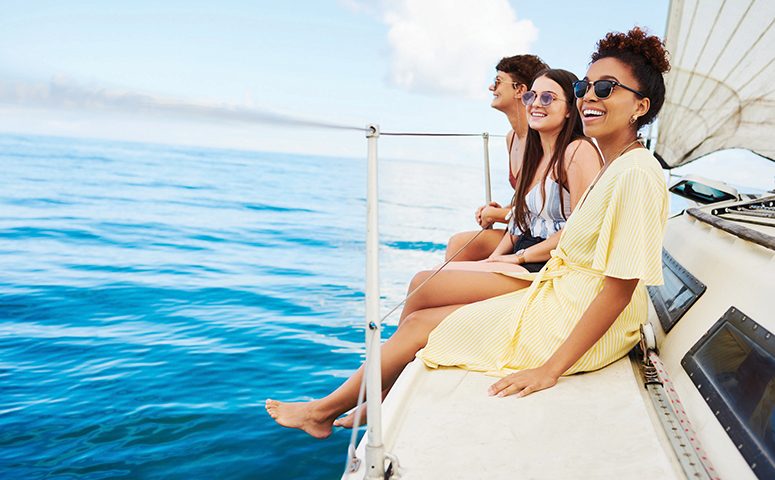WATER-RELATED INJURIES
BOATING

Boating is a popular recreational activity. In 2019 there were an estimated 11.88 million registered vessels in the United States.58 Most boats stay in domestic coastal or inland waters, but some sail abroad. Boating can involve hazards associated with the vessel itself as well as with the destination. Boaters also need to watch for swimmers and divers.
Boaters who undertake long, oceangoing voyages are most at risk because they may be isolated and out of reach of help in case of emergency. Boaters who anchor in remote destinations that are uninhabited or lack emergency medical services similarly need to be self-reliant. Such intrepid travelers must be ready to face emergencies that include a range of acute illnesses and injuries that threaten life, limb or function.
In 2019 the U.S. Coast Guard received reports of 4,168 boating accidents with 2,559 injuries and 613 deaths. The fatality rate is 5.2 deaths per 100,000 registered recreational vessels.59 Table 11 lists some causes of recreational boating deaths in 2019.
Drowning caused 79 percent of these boating deaths; 86 percent of drowning victims were not wearing a life jacket, and 80 percent of the boaters who drowned were on a vessel less than 21 feet in length. Capsizing and falling overboard were common accidents that resulted in death. Alcohol use was the leading known contributing factor in fatal boating accidents and was identified in 23 percent of the deaths. Other contributing factors included operator inattention, improper lookout, operator inexperience and excessive speed.61
If an emergency occurs during offshore sailing, it is important to have some means of communication with other vessels or the shore to alert rescuers. Sometimes it is impossible to establish a connection, however, reducing the chance of rescue. In such cases, survival at sea depends on many factors, and any search and rescue must start as soon as possible. Many boaters file “float plans” just as pilots file flight plans. Float plans are not filed with the Coast Guard or its equivalent in other countries but rather with a friend or relative so that person knows where to start searching if anything should happen while a boat is at sea.
Boaters must be well prepared and equipped for a range of medical emergencies. DAN offers a suite of first aid courses and a variety of medical kits appropriate for boating. For offshore sailing, boaters must meet international regulations as well as country-specific requirements at all their ports of call and at their final destination. For more information, call DAN (+1-919-684-2948) or a boating organization.
Tips for Boating Safety
- Don’t drink alcohol while boating.
- Turn on your emergency radio, and keep it on.
- Don’t go faster than the speed limit.
- Make sure your boat is properly maintained.
- Don’t overload your boat.
- Mind the weather.
- Use and wear Coast Guard-approved life jackets.
- Take a boating safety course.
- Know what to do in case of an emergency.
Table 11.
Causes of Death Among
U.S. Recreational Boaters, 2019
DAN Customer Service
Mon–Fri, 8:30 a.m. – 5 p.m. ET
+1 (919) 684-2948
+1 (800) 446-2671
Fax: +1 (919) 490-6630
Email: Member@DAN.org
24/7 Emergency Hotline
In event of a dive accident or injury, call local EMS first, then call DAN.
24/7 Emergency Hotline:
+1 (919) 684-9111
(Collect calls accepted)
DAN must arrange transportation for covered emergency medical evacuation fees to be paid.
Medical Information Line
Get answers to your nonemergency health and diving questions.
Mon–Fri, 8:30 a.m. – 5 p.m. ET
+1 (919) 684-2948, Option 4
Online: Ask A Medic
(Allow 24-48 hours for a response.)